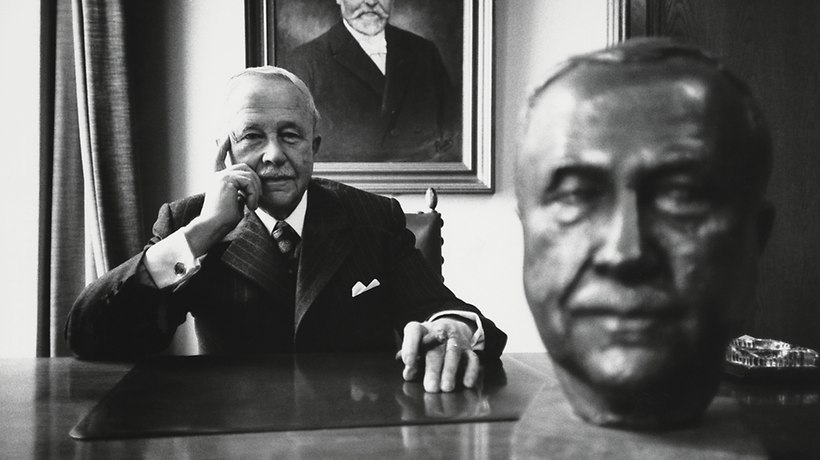

Quotes give an idea of people’s character, and there is hardly any remark that sums up August Claas better than the sentence: “Then we’ll just do it on our own.” He came out with this terse response when he found that none of the German manufacturers of agricultural machinery was prepared to collaborate with him on the development of the first European combine harvester with him.
Traits such as tenacity and the belief in his own capabilities form a recurrent theme in the life of August Claas. He was born on 15 December 1887 as the second-oldest son in the family. Within the family, it was recognised at an early stage that August was someone who liked to take control. His courage in making decisions, and also in taking risks at the right time, made him a born entrepreneur.
On his parents’ farm, for example, he already assumed a kind of leadership role. When the first hay balers in his father’s production business gave up the ghost, it was left to him to solve the problem. He not only had to repair the machines, but also needed to placate the customers. And when his father’s business was facing ruin, he took the quick decision to register a business in his own name. This courageous step in the year 1913 eventually led to the establishment of today’s company.
Although the word “visionary” is frequently used in an inappropriate context to describe routine future planning, the use of the term with regard to August Claas accurately reflects his greatest personal attribute, apart from his pragmatic and technical bent. He realised at an early stage that farming in the future would require more complex solutions. Within this system, a combine is only one part of an extensive chain – albeit a central one.
August Claas was responsible for the remarkable growth of the company, which he expanded from what was originally a small enterprise into a global group. International honours, orders of merit and medals, technical awards and countless patents bear testimony to his successful life as an entrepreneur.
He was a practising Catholic who, with the help of his brothers, staked everything on getting their company started. When August Claas made the acquaintance of a young student called Paula Siepenkort, who was working as an interpreter on the CLAAS exhibition stand at the Leipzig Agricultural Fair, he proposed to her on the spot, even if it was a somewhat careful proposal. Some time later, he described his good fortune in finding such a loving wife who could work in harmony with him – helping not just with his growing family, but also the flourishing company.
As the father of Helmut, Irmgard and Reinhold, he often found the time in the evenings to recount adventure stories in which machines in the factory played a key role.
In these charming stories, invented as he went along, machine tools and also cars could speak. They complained that they were not oiled in time. On Sunday afternoon, the whole family went for country walks with their dog. In the woods around Harsewinkel, he explained the world of plants to his children, and whittled “flute pipes” from small branches for them.
Hunting was one of his hobbies: meeting and chatting with his hunting friends was just as much part of his leisure schedule as exchanging news and opinions with friends from the world of agriculture, in Westphalian dialect, or in the evening over a glass of “Korn” (corn schnapps). His family and circle of friends jokingly called him “De Buer” (the farmer).
Since he managed his own farm, he exchanged ideas with other farmers about ploughs, planting seeds or the best time to harvest. He was one of the leading farmers in the region for growing maize and silage preparation. Animal breeding was another of August Claas’ areas of interest. He was also a very keen cattle breeder, and was one of the first to introduce the Scottish Aberdeen Angus and the French Charolais cattle to the region, and cross-breed them with his own Holstein herd.
However, the agricultural machinery business was at the centre of all his activities. He got through difficult periods for the family business, where he was pushed to the limit, with determination, optimism and ability – all fully in keeping with his motto “Then we’ll just do it on our own”. August Claas died on 12 April 1982, at the age of 94.







